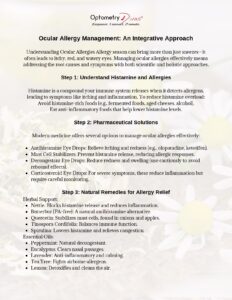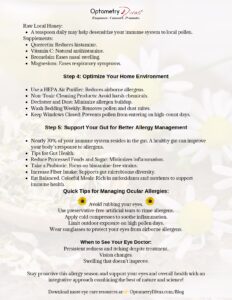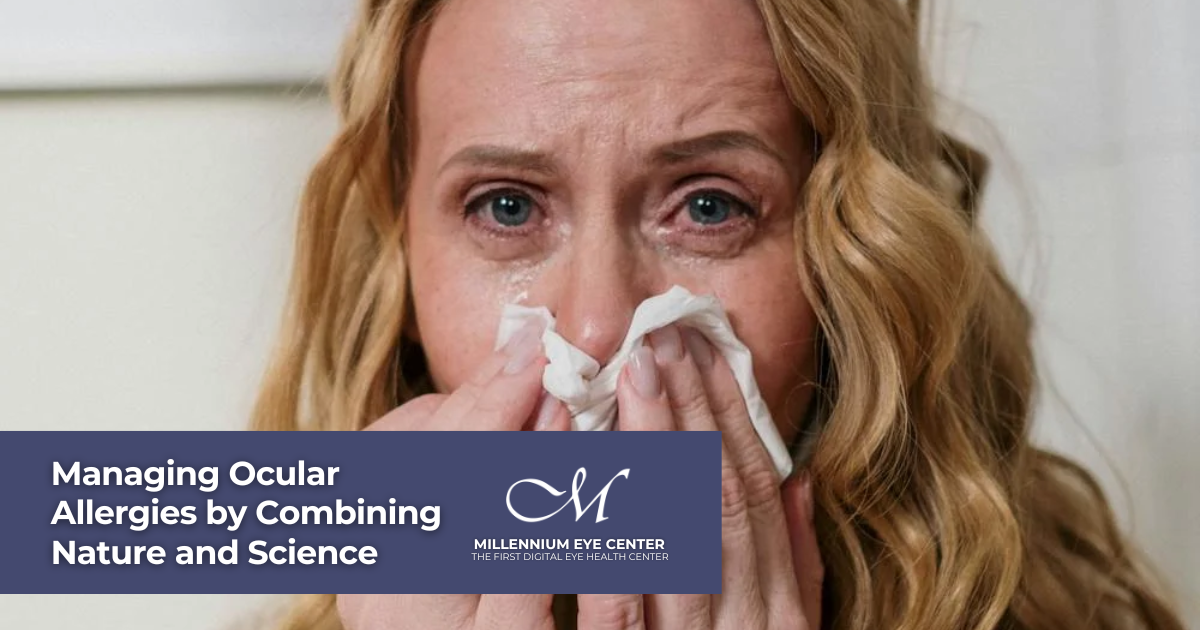Allergy season can feel like an annual battle against invisible forces, leaving many with itchy eyes, congestion, and an overwhelming need to sneeze at the worst possible moments.
At Millennium Eye Center, we understand the frustration and discomfort that ocular allergies can bring. While over-the-counter antihistamines might seem like the easiest fix, they often come with unwanted drowsiness and side effects.
Thankfully, there are holistic and scientific ways to support your body during allergy season that not only address symptoms but also strengthen your immune system and overall resilience.
Let’s dive into how you can take an integrative approach to managing allergies, combining the best of nature and modern science.
Understanding Histamine and Allergies
Histamine plays a crucial role in allergic reactions. It’s a compound your immune system releases when it detects an allergen, leading to the familiar symptoms of sneezing, congestion, and inflammation. While histamine is necessary for immune function and digestion, excess histamine can cause a host of issues, especially in those who have histamine intolerance or struggle with seasonal allergies.
To mitigate histamine overload, consider avoiding histamine-rich foods like fermented foods, aged cheeses, and alcohol during peak allergy season. Instead, prioritize anti-inflammatory, histamine-lowering foods and supplements that help regulate immune responses.
Pharmaceutical Solutions: The Scientific Edge
Modern medicine offers several pharmaceutical options to manage ocular allergies effectively. At Millennium Eye Center, we can guide you in choosing the best option for your specific needs:
- Antihistamine Eye Drops: Such as olopatadine (Pataday) or ketotifen (Zaditor), which relieve itching and redness.
- Mast Cell Stabilizers: Prevent the release of histamine and other chemicals that cause allergic reactions.
- Decongestant Eye Drops: Reduce redness and puffiness but should be used with caution to avoid rebound effects.
- Corticosteroid Eye Drops: For more severe cases, these can reduce inflammation but require careful monitoring due to potential side effects.
Harnessing the Power of Herbs: Nature’s Remedies
Nature provides us with an array of herbs that act as natural antihistamines, immune modulators, and inflammation fighters. Some of the best herbs for allergy season include:
- Nettle (Urtica dioica): Naturally blocks histamine release and reduces inflammation. Nettle tea or supplements can be a game-changer during allergy season.
- Butterbur (PA-free): Shown to be as effective as some antihistamines without the drowsy side effects. It inhibits leukotrienes, which contribute to allergic reactions.
- Quercetin: Found in foods like onions, apples, and capers, quercetin stabilizes mast cells and prevents histamine release.
- Tinospora Cordifolia: Used in Ayurvedic medicine, this adaptogenic herb balances immune function and has been shown to improve allergy symptoms.
- Spirulina: A blue-green algae rich in antioxidants, spirulina can reduce histamine levels and improve nasal congestion.
Optimizing Your Home Environment: Creating an Allergen-Free Sanctuary
Your home should be a refuge from allergens, but it can easily become a trap for pollen, dust, and mold. Small changes can make a big difference in minimizing allergen exposure:
- Invest in an Air Purifier: A high-quality HEPA air purifier can significantly reduce airborne allergens like pollen, pet dander, and mold spores.
- Use Non-Toxic Cleaning Products: Harsh chemicals in conventional cleaning supplies can aggravate allergies. Opt for fragrance-free, non-toxic alternatives.
- Declutter and Dust Regularly: Pollen and dust mites accumulate on surfaces, so keep your home tidy and dust often.
- Wash Bedding Weekly: Pollen can linger on your hair and clothes, transferring onto bedding. Washing in hot water weekly reduces exposure.
- Keep Windows Closed on High Pollen Days: Check pollen counts and keep windows shut to prevent allergens from entering your home.
Essential Oils for Allergy Relief: Aromatherapy and Natural Support
Essential oils can provide relief from congestion and inflammation while supporting immune function. Some of the best essential oils for allergies include:
- Peppermint: Acts as a natural decongestant and soothes inflamed airways.
- Eucalyptus: Helps clear nasal passages and has antimicrobial properties.
- Lavender: A natural antihistamine that reduces inflammation and promotes relaxation.
- Tea Tree Oil: Fights airborne allergens like mold and dust mites.
- Lemon: Supports detoxification and cleanses the air when diffused.
Use essential oils in a diffuser or add a few drops to a bowl of steaming water for inhalation.
The Sweet Relief of Raw Honey: Local and Natural
Local raw honey is a popular natural remedy for allergies. The theory is that consuming small amounts of local pollen through honey can help desensitize your immune system, similar to how allergy immunotherapy works. Adding a teaspoon of raw, unfiltered honey to your daily routine during allergy season can be a delicious and antioxidant-rich addition.
Strategic Supplementation: Boosting Your Defenses
Strategic supplementation can bolster your body’s defenses against allergens. Key supplements include:
- Quercetin: Helps stabilize mast cells and reduce histamine release.
- Vitamin C: A natural antihistamine that supports immune health.
- Bromelain: Found in pineapple, it reduces nasal swelling and improves sinus drainage.
- Probiotics: Gut health plays a crucial role in immune regulation.
- Magnesium: A bronchodilator that can ease respiratory symptoms and reduce inflammation.
The Allergy-Gut Health Connection: Nurturing Your Inner Ecosystem
Your gut health and immune system are deeply intertwined. Nearly 70% of the immune system resides in the gut, making a balanced gut microbiome essential for preventing and managing allergies.
Common Gut Issues That Exacerbate Allergies:
- Leaky Gut Syndrome: When the intestinal lining becomes permeable, undigested food particles and toxins enter the bloodstream, triggering immune responses.
- Dysbiosis: An imbalance of good and bad bacteria can contribute to inflammation and histamine intolerance.
Supporting Gut Health for Allergy Prevention:
- Reduce processed foods and sugar.
- Take a quality probiotic with histamine-free strains.
- Increase fiber intake to support gut diversity.
- Eat colorful, balanced meals rich in antioxidants, fiber, and protein.
By nurturing your gut, you create a strong foundation for overall immune health, reducing the likelihood of severe allergic reactions and histamine intolerance.
At Millennium Eye Center, we believe in an integrative approach to eye care, combining the best of modern medicine and natural remedies to provide comprehensive and personalized solutions for our patients.
Ready to tackle allergy season with a holistic approach? Contact us today to schedule a consultation and learn how we can help you find lasting relief.


👉 [Download our Ocular Allergy Management Handout] and give them the tools they need for lasting relief!
Millennium Eye Center is a leading provider of comprehensive eye care in the Orlando area. Our experienced team of optometrists can help you manage your astigmatism and achieve optimal eye health.
Whether the best choice is glasses, contacts, or other treatment, we understand that the optimal vision correction solution is one that’s tailored to each individual patient. To schedule an appointment with our Eye Expert, Dr. Lauretta Justin, CLICK HERE or text us at 407-292-9812.
[BOOK AN EYE EXAM HERE]
Thank you for choosing us as your family’s partners in lifelong vision health. We treasure the trust you place in our practice!
Top image used is a License-free image from Pixabay.
Disclaimer: The content on this blog is not intended to be a substitute for professional medical advice, diagnosis, or treatment. Always seek the advice of qualified health providers with questions you may have regarding medical conditions.

